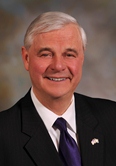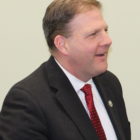Distant Dome is co-published by InDepthNH.org and Manchester Ink Link.
By GARRY RAYNO, Distant Dome
What began as a highly controversial program — Medicaid expansion — has become a cornerstone of the state’s fight against opioid addiction.

Garry Rayno
After fits and starts with a politically divided legislature in 2013, a commission was established, but its recommendation went down in flames at the beginning of the 2014 session.
Later that session a group of bipartisan state senators hammered out what became the New Hampshire Health Protection Program which used the state’s individual health insurance exchange and an existing program that paid insurance premiums for eligible adults to eventually provide health insurance for about 50,000 low-income adults.
Several changes were made when the program was reauthorized in 2015 including having hospitals and insurance companies pay the state’s share, which is currently 6 percent.

Sen. Jeb Bradley, R-Wolfeboro
The reauthorization was driven by the Senate Republican leadership including Senate Majority Leader Jeb Bradley and Senate President Chuck Morse and had the backing of former House Speaker Shawn Jasper.
The reauthorization squeaked through the House but had little trouble in the Senate, but since that time some things have changed.
Since then the federal Center for Medicaid Services said service providers cannot pay the state share’s and New Hampshire will have to find another way to fund expansion by the end of this year.
The state reduced its financial risk by using private insurers for coverage and it increased reimbursement rates for health care providers, particularly hospitals and their medical empires.
Without coverage experience with the new population not connected to the medical system, insurers guessed what it would cost.
Everyone knew the first three years would be dicey, but not how dicey and the individual market premiums spiked for everyone on the exchange.
A committee was established to see what could be done to lower the costs as the state’s share increases to the 10 percent plateau in 2022, while the federal government is expected to pay its 90 percent. Whether the federal government meets it obligation remains to be seen, the new administration is doing all it can to upend the Affordable Care Act.
With all the uncertainty, lawmakers begin Tuesday to debate the latest version of Medicaid expansion proposed by Bradley and Morse.

Sen. Chuck Morse
The changes are significant and include several provisions Republicans wanted in the last reauthorization but the Obama administration denied, a work requirement and penalties for using expensive emergency room services for routine care.
The proposal under Senate Bill 313 would scrap private insurance coverage and move the expansion population into the state’s traditional managed-care Medicaid program which serves about 100,000 individuals.
The state contracts with two managed care insurers to administer the traditional program whose costs are split evenly between the state and federal governments.
The name for the Medicaid expansion program would be changed to the New Hampshire Granite Advantage Health Care Program and it would be in place for the next five years as a demonstration program, which means the federal government is likely to pay more than its 90 percent share and the state needs a federal CDC waiver to move forward.
The Trump administration has already signaled it would allow work requirements and the GOP leadership in the Legislature is betting it will also approve a number of incentives for patients to choose the least cost service provider, as well as the disincentives if patients use inappropriate services like emergency rooms for a sore throat.
And the program does not allow state general fund money to pay its share but establishes a trust fund much like earlier versions of Medicaid expansion. The trust fund will be the source of state’s payments and will accept “any gifts, grants, donations, or other funding from any source.”
If the money in the trust fund is not enough the program will end.
The proposal also raises the alcohol abuse prevention and treatment fund to 5 percent of the Liquor Commission’s gross profits and designates some of the money to help pay for substance abuse services under expansion.
Money from the insurance premium tax from expansion coverage would also go into the trust fund as would any excess money from the high-risk pool.
However, hospitals are less likely to be making “donations” into the trust fund because their uncompensated care, or services they provide that are not paid for, is likely to increase under the proposal.
New Hampshire is notorious for its low Medicaid reimbursement rates which supply about 50 cents of a dollar in costs.
Hospitals receiving private insurance reimbursement rates for the Medicaid expansion population would see a serious reduction with managed care rates.
One of the reasons for using private insurance was to provide more money to hospitals and other providers as well as to reduce their uncompensated care costs as the federal government reduced the Disproportionate Share Hospital or DSH program to help cover those costs.
The proposal also uses federal money earmarked for the state’s Temporary Assistance for Needy Families (or welfare) program but not spent to create the Granite Workforce pilot program to train Medicaid recipients in high-need jobs such as in the medical profession, substance abuse treatment, and the hospitality industry.
Employers would be eligible for two $2,000 grants for employing an eligible individual.
Also the program would provide such things as training and education, as well as transportation, child care or other services that prevent someone receiving Medicaid from working.
A person receiving Medicaid expansion benefits would have to work or perform community service of 100 hours a month, or be in training or a treatment program, or be a caregiver or pregnant in order to retain eligibility.
And a person could not have assets greater than $25,000 not counting a home or an automobile.

Gov. Chris Sununu
As with many program changes, lawmakers will be asked to create a study commission to determine how well the new program performs compared to the current version.
Although this program has many elements that make it more palatable to Republicans than earlier versions of expansion, this is not likely to be an easy sell in the House.
In his State of the State address last week, Gov. Chris Sununu said the state needs to continue Medicaid expansion to help combat the state’s opioid addiction epidemic, but noted the players were still trying to agree on one plan.
Sununu voted against the first contract allowing expansion to go forward when he was an Executive Councilor so many thought he would oppose continuing the program.
The debate begins Tuesday at 1:30 p.m. in Representatives Hall before the Senate Finance Committee.
The last reauthorization three years ago drew a full house of supporters ranging from people in substance abuse treatment to hospital CEOs.
It will be interesting to see who turns out for the public hearing on this plan.
Garry Rayno may be reached at garry.rayno@yahoo.com.
Garry Rayno’s Distant Dome runs exclusively on Manchester Ink Link and InDepthNH.org, where Rayno will explore a broader perspective on State House – and state – happenings. Over his three-decade career Rayno has closely covered the NH State House for the New Hampshire Union Leader and Foster’s Daily Democrat, and his coverage spanned the news spectrum, from local planning, school and select boards, to national issues such as electric industry deregulation and Presidential primaries. He is former editor of The Hillsboro Messenger and Assistant Editor of The Argus-Champion. Rayno graduated from the University of New Hampshire with a BA in English Literature and lives with his wife Carolyn in New London.





